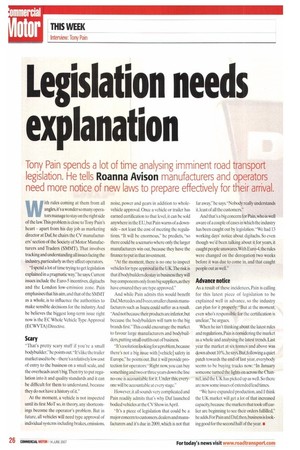Legislation needs explanation
Page 26

If you've noticed an error in this article please click here to report it so we can fix it.
Tony Pain spends a lot of time analysing imminent road transport
legislation. He tells Roanna Avison manufacturers and operators need more notice of new laws to prepare effectively for their arrival.
With rules coming at them from all angles, it's a wonder so many operators manage to stay on the right side of the lawThis problem is close to Tony Pain's heart — apart from his day job as marketing director at Qat he chairs the CV manufacturers' section of the Society of Motor Manufacturers and Traders (SMMT). That involves tracking and understanding all issues facing the industry, particularly as they affect operators.
"I spend a lot of time trying to get legislation explained in a pragmatic way," he says. Current issues include the Euro-5 incentives, digitachs and the London low-emission zone. Pain emphasises that his aim, and that of the SMMT as a whole, is to influence the authorities to make sensible decisions for the industry. And he believes the biggest long-term issue right now is the EC Whole Vehicle Type Approval (ECWVTA) Directive.
Scary "That's pretty scary stuff if you're a small bodybuilder-he points out."It'slike the trailer market used to bethere's a relatively low cost of entry to the business on a small scale, and the overheads aren't big. Then try to put regulation into it and quality standards and it can be difficult for them to understand, because they do not have a history of it."
At the moment, a vehicle is not inspected until its first MoT so, in theory. any shortcomings become the operator's problem. But in future, all vehicles will need type approval of individual systems including brakes, emissions, noise, power and gears in addition to wholevehicle approval. Once a vehicle or trailer has earned certification to that level, it can be sold anywhere in the EU, but Pain warns of a downside — not least the cost of meeting the regulations. "It will be enormous." he predicts, "so there could be a scenario where only the larger manufacturers win out, because they have the finance to put in that investment.
"At the moment, there is no one to inspect vehicles for type approval in the UK.The risk is that if bodybuilders do stay in business they will buy components only from big suppliers,as they have ensured they are type approved."
And while Pain admits this would benefit Daf,Mercedes and Iveco,smaller chassis manufacturers such as Isuzu could suffer as a result. "And not because their products are inferior,but because the bodybuilders will turn to the big brands first." This could encourage the market to favour large manufacturers and bodybuilders,putting small outfits out of business, "It's a solution looking fora problem,because there's not a big issue with [vehicle] safety in Europe," he points out. But it will provide protection for operators: "Right now, you can buy something and two or three years down the line no-one is accountable for it. Under this, everyone will be accountable at every stage."
However, it all sounds very complicated and Pain readily admits that's why Daf launched bodied vehicles at the CV Show in April.
"It's a piece of legislation that could be a major concern to customers, dealers and manufacturers and it's due in 2009, which is not that far away," he says. "Nobody really understands it, least of all the customers."
And that's a big concern for Pain,who is well aware of a couple of cases in which the industry has been caught out by legislation."We had 13 working days' notice about digitachs. So even though we'd been talking about it for years, it caught people unawares.With Euro-4,the rules were changed on the derogation two weeks before it was due to come in, and that caught people out as well."
Advance notice
As a result of these incidences, Pain is calling for this latest piece of legislation to be explained well in advance, so the industry can plan for it properly: "But at the moment, even who's responsible for the certification is unclear," he argues.
When he isn't thinking about the latest rules and regulations, Pain is considering the market as a whole and analysing the latest trends Last year the market at six tonnes and above was down about 10%, he says.But,following a quiet patch towards the end of last year, everybody seems to be buying trucks now: "In January someone turned the lights on across the Channel, and the UK has picked up as well. So there are now some issues of extended lead times.
"We have expanded production, and I think the UK market will get a lot of that increased capacity, because the markets that took off earlier are beginning to see their orders fulfilled," he adds. For Pain and Daf, then, business is looking good for the second half of the year. •


























































































































































































